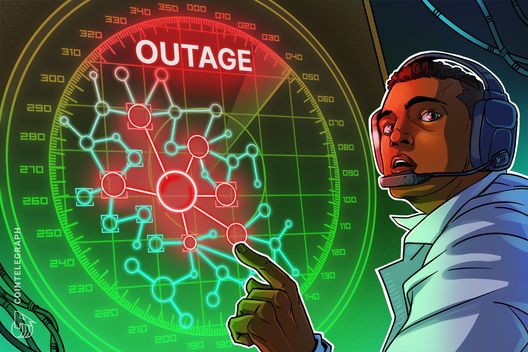Cloudflare outage shows why crypto needs end-to-end decentralization

Analysis
Price Impact
LowThe cloudflare outage exposed vulnerabilities in crypto protocols relying on web2 infrastructure. while several platforms were temporarily affected, the news primarily serves as a call for increased end-to-end decentralization, rather than a direct, immediate market-moving event for specific assets.
Trustworthiness
HighThe article is from cointelegraph, a reputable crypto news source, and features insights from industry platforms like ethstorage and filecoin, along with a significant quote from ethereum co-founder vitalik buterin, adding strong credibility to the analysis.
Price Direction
NeutralThe news highlights a fundamental architectural challenge and opportunity for the crypto ecosystem. it doesn't present an immediate bullish or bearish catalyst for the overall market, but rather a long-term imperative for projects to enhance their resilience through decentralization. truly decentralized projects may see a long-term increase in their value proposition.
Time Effect
LongAchieving end-to-end decentralization for crypto protocols is a gradual process requiring significant changes in development roadmaps and infrastructure. the effects of projects adopting more decentralized frontends and storage will unfold over months to years.
Original Article:
Article Content:
Brayden Lindrea 3 minutes ago Cloudflare outage shows why crypto needs end-to-end decentralization Many blockchains are decentralized, but their frontends and storage still rely on Web2 — a weakness exposed when the Cloudflare outage knocked several platforms offline, EthStorage said. Listen 0:00 27 News COINTELEGRAPH IN YOUR SOCIAL FEED The crypto ecosystem has made strides in decentralizing blockchains, but the recent Cloudflare incident showed that true resilience requires decentralizing the frontend and storage layers as well, blockchain infrastructure platforms argue. Decentralizing blockchains through consensus, a robust set of validators, and smart contracts is essential, but it represents only one side of the equation,” an EthStorage spokesperson explained to Cointelegraph on Wednesday “True resilience requires rethinking the whole stack — not just the blockchain layer,” they said, highlighting that Remote Procedure Call, Domain Name System, API, indexing and storage should also be decentralized. This kind of “end-to-end decentralization” ensures that protocols cannot be taken down by a single point of failure, EthStorage said. Source: EthStorage Blockchain.com, Coinbase, Ledger, BitMEX, Toncoin, Arbiscan, and DefiLlama were among the crypto protocols that were impacted by the Cloudflare network outage on Tuesday, which impacted around 20% of internet traffic. A similar number of crypto protocols were also impacted by the Amazon Web Services outage one month ago. EthStorage, Protocol Labs via IPFS and Filecoin, and Arweave are among the crypto platforms building decentralized HTTP and storage solutions for crypto protocols to respond more resiliently to internet failures. Filecoin also addressed the Cloudflare incident, stating: “Outages like yesterday show how much traffic flows through a handful of centralized networks,” while adding that “Relying on a single cloud provider creates limits for any society that depends on stable access to data.” EthStorage said many crypto protocols rely on Web2 infrastructure for frontend and supporting layers out of convenience and familiarity. Many teams assume that decentralized alternatives are slower, more expensive, harder to maintain, and less user-friendly, but EthStorage said these assumptions are “outdated.” They also deprioritize decentralization because they’re more focused on a smooth launch and building a user base, EthStorage said. “Since users don’t usually see the infrastructure underneath, there’s little immediate pressure to decentralize. As a result, decentralization becomes an ‘optional later step’ instead of a core architectural requirement.” Decentralization doesn’t have to happen overnight For crypto protocols that still rely on centralized components, EthStorage said the good news is that full decentralization can be achieved gradually: “Achieving full decentralization across every layer of the stack doesn’t have to happen overnight. What matters is that projects intentionally align their roadmap with this direction — gradually removing centralized dependencies across execution, storage, and access as the project matures.” Related: $90K Bitcoin price is a ‘close your eyes and bid’ opportunity: Analyst They added: “Incorporating this direction into their roadmap ensures that, over time, they move toward a resilient and fully decentralized architecture that cannot be taken down by any single vendor outage.” Never sacrifice decentralization: Vitalik Buterin Last Wednesday, Ethereum co-founder Vitalik Buterin said in a “Trustless Manifesto” that builders should never sacrifice decentralization in pursuit of adoption. Buterin and Ethereum Foundation researchers Yoav Weiss and Marissa Posner, said protocols sacrifice trustlessness from the first moment that they integrate a hosted node or centralized relayer, explaining that while it feels harmless, each new checkpoint becomes a potential chokepoint. Magazine: If the crypto bull run is ending… it’s time to buy a Ferrari: Crypto Kid # Blockchain # Decentralization # CloudFlare # Adoption # Cybersecurity Add reaction